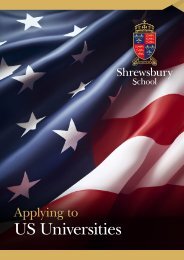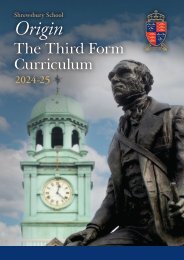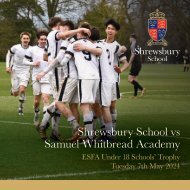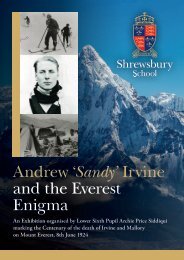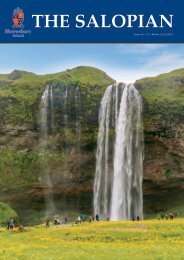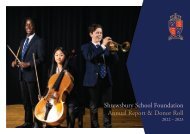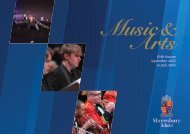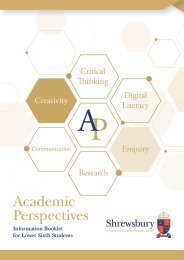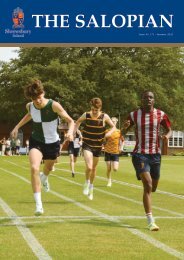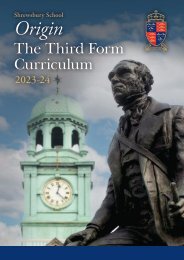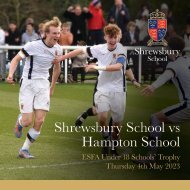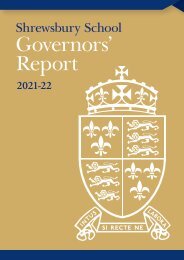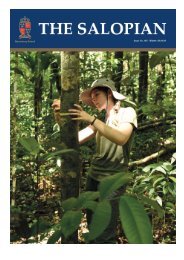The Salopian no. 157 - Winter 2015
Create successful ePaper yourself
Turn your PDF publications into a flip-book with our unique Google optimized e-Paper software.
78<br />
OLD SALOPIAN NEWS<br />
Dr Philip Heal (R 1946-51)<br />
Philip Heal was born on 21st July 1932 in Exeter, where<br />
both his parents were GPs. He went to Twyford Prep<br />
School in Hampshire aged eight and then on to Shrewsbury.<br />
He was a keen cross-country runner and rower at school<br />
and was House Captain of Cross-Country and Athletics. He<br />
was made a Praepostor and was a member of a number of<br />
societies and committees. After leaving Shrewsbury, he went<br />
on to St John’s College, Cambridge to read Medicine, where<br />
he met and married his wife, Diana.<br />
their families and 11 grandchildren. He was also a much<br />
devoted lover of boxer dogs! He died suddenly at home on<br />
7th April <strong>2015</strong>, sitting in his chair after driving home from<br />
Hereford following a happy family Easter weekend.<br />
After house jobs in St Thomas’, Exeter, he did three years<br />
colonial service in Uganda, running an up-country hospital<br />
in Masindi. On return to England in 1962, he joined his<br />
parents’ practice before doing courses in anaesthetics and<br />
obstetrics. He was then a founder member of a large GP<br />
group practice in St Thomas’, Exeter until he retired in 1992.<br />
His hobbies were sailing, walking and painting. He made<br />
expeditions to Everest Base Camp, the Ruwenzories and<br />
Atlas Mountains. He was a very proud father of his sons and<br />
David Howl (S 1950-54)<br />
David Howl’s life is an example of triumph over adversity,<br />
of turning misfortune to advantage. As a result of a road<br />
accident when he was 22, David had his left leg amputated<br />
above the knee. Despite this he became an excellent skier<br />
and eventually a guide for blind skiers. He was one of<br />
the four people at the inaugural meeting of the British Ski<br />
Club for the Disabled on 23rd October 1974 and was at<br />
the Second Olympic <strong>Winter</strong> Games for Disabled in Oslo<br />
in 1980. He also rode regularly and loved walking and,<br />
when terrain allowed, driving in S<strong>no</strong>wdonia and over<br />
the Shropshire hills. He was a great promoter of sport<br />
for disabled people, making the most of his abilities and<br />
encouraging others to do the same.<br />
with a determination <strong>no</strong>t to be defeated. He learned to draw<br />
and travelled all over the West Midlands and Shropshire<br />
recording buildings and local scenes of interest. He<br />
wrote prodigious letters and diaries and most pages were<br />
embellished with one of his sketches or cartoons.<br />
He also wrote a history of Parkdale in Wolverhampton,<br />
where he lived most of his life. Parkdale was planned in<br />
the nineteenth century as a recreational area away from the<br />
pollution of the many factories, and it was largely David’s<br />
persistent efforts and research that prevented the large<br />
Victorian houses being demolished and the destruction of<br />
the central gardens and sports area by developers. It is <strong>no</strong>w<br />
a conservation area and may be considered a memorial to<br />
the strength of character that David displayed during his life.<br />
As if one setback was <strong>no</strong>t e<strong>no</strong>ugh, he became ill with<br />
Hodgkins Lymphoma, but again he faced pain and hardship<br />
Vice-Admiral Sir John Lea (Rt 1937-41)<br />
Vice-Admiral Sir John Stuart Crosbie Lea, who has died at<br />
the age of 91, had a distinguished career in the Royal Navy,<br />
stretching from active service in the Second World War to<br />
retirement in 1980. He was born in 1923, in India, where<br />
his father was an officer in the Indian Army, and where his<br />
education began. After a few months in Australia, a country<br />
which was later to win a place in his heart, his parents<br />
separated, his father returning to India and his mother<br />
taking the children to England and prep school. From<br />
Boxgrove School in Guildford, where he found stability<br />
at a turbulent time, he went to Shrewsbury, where he<br />
initially followed the traditional <strong>Salopian</strong> Classical syllabus.<br />
When war broke out, however, he was determined to join<br />
the Royal Navy, and therefore switched to Science, Maths<br />
and Mechanics. He won a place at the Naval Engineering<br />
College in Plymouth from where, in only his second year<br />
as a student, he was sent to sea for training. Aboard HMS<br />
Sheffield, he saw action off Italy and subsequently visited<br />
the severely damaged island of Malta. Later in the year,<br />
he was on the cruiser Glasgow in the Bay of Biscay when



